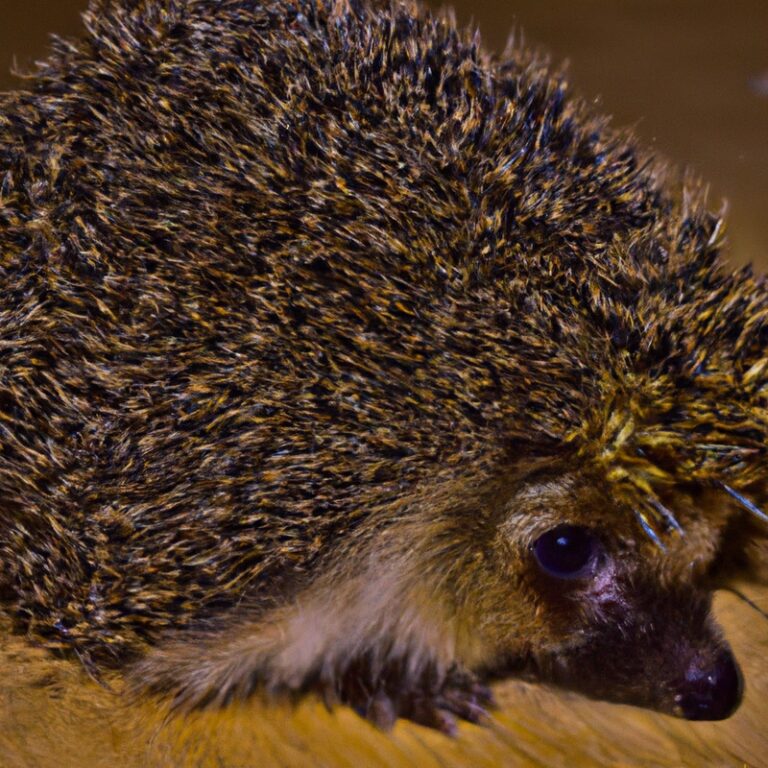How To Contribute To Hedgehog Research And Studies?
Key Takeaways:
- Support local hedgehog conservation charities to contribute to research and studies.
- Create a hedgehog-friendly garden by providing food, shelter, and safe passages.
- Report hedgehog sightings and share data with research organizations.
- Volunteer or participate in community-led projects focused on hedgehog research.
Are you fascinated by these prickly little creatures and eager to support their conservation efforts? If so, you’ve come to the right place! Hedgehog research plays a crucial role in understanding and protecting these charming animals, and you can be a part of it.
In this article, we’ll explore the importance of hedgehog research, the current state of the field, and most importantly, how you can contribute.
Whether you want to become a citizen scientist, volunteer at wildlife organizations, or simply spread awareness, there are plenty of ways to make a meaningful impact. So, let’s dive in and discover how you can help hedgehog research soar to new heights!
What is Hedgehog Research?
Hedgehog research involves studying and analyzing various aspects of hedgehog biology, behavior, and conservation to increase our understanding of these fascinating creatures.
The Importance of Hedgehog Research
Hedgehog research is vital for several reasons. Firstly, it helps us understand the behavior and ecology of these fascinating creatures.
By studying their habits, we can learn how to better protect their habitats and prevent their decline.
Additionally, hedgehog research allows us to gather important data on population sizes and trends, which is crucial for conservation efforts. Lastly, research on hedgehogs provides insights into broader ecological processes and can contribute to our understanding of the overall health of ecosystems.
Current State of Hedgehog Research
Currently, hedgehog research is a rapidly growing field that focuses on understanding various aspects of hedgehog biology and behavior. Researchers are investigating hedgehog population dynamics, habitat preferences, dietary requirements, and reproductive patterns.
Additionally, there is a significant amount of research being done on the impact of human activities, such as urbanization, on hedgehog populations.
Studies are also exploring potential conservation strategies to protect hedgehog habitats and mitigate threats they face. This research contributes to our knowledge of hedgehogs and helps inform conservation efforts to ensure their survival.
Why Contribute to Hedgehog Research
Contribute to hedgehog research because it helps us understand these unique creatures better. Your involvement can provide valuable insights into hedgehog behavior, habitat, and health.
By contributing, you are actively supporting efforts to conserve and protect hedgehog populations.
Your contribution, whether through observations, data collection, or financial support, plays a vital role in shaping conservation strategies and ensuring the survival of these adorable animals for future generations. Together, we can make a difference!

Ways to Contribute to Hedgehog Research
You can contribute to hedgehog research by getting involved in citizen science projects, volunteering at wildlife organizations, donating to hedgehog research initiatives, and spreading awareness.
Citizen Science Projects
Citizen Science Projects are a great way to contribute to hedgehog research and studies! One project you can join is the Hedgehog Street project, where you can record hedgehog sightings in your area and help researchers track their numbers. Another project is the Big Hedgehog Map, where you can submit hedgehog sightings and contribute to a national database.
You can also participate in research by volunteering for local wildlife organizations or collaborating with researchers on specific projects.
Just remember, every contribution, no matter how small, can make a big difference in the study and conservation of hedgehogs.
Volunteering at Wildlife Organizations
Volunteering at wildlife organizations is a great way to contribute to hedgehog research.
You can help with monitoring and data collection, participate in rescue and rehabilitation efforts, and educate the public about hedgehog conservation.
By offering your time and skills to these organizations, you directly contribute to the understanding and protection of hedgehogs.
Plus, you get the chance to work with experienced professionals and learn more about these fascinating creatures.
So, if you’re passionate about hedgehogs and want to make a difference, consider volunteering at wildlife organizations near you.
Donating to Hedgehog Research Initiatives
Donating to hedgehog research initiatives is a great way to support the conservation and study of these adorable creatures.
By making a contribution, you can help fund important research projects that aim to understand hedgehog behavior, habitat needs, and population trends.
Your donation may also be used to provide medical care for injured or sick hedgehogs in rehabilitation centers.
Whether you donate money, supplies, or your time as a volunteer, your support will make a valuable impact on hedgehog research and conservation efforts.

Spreading Awareness
Spreading awareness about hedgehog research is essential for their conservation.
Here are some ways you can help:
- Share information: Use social media platforms, blogs, or community groups to share interesting facts and news about hedgehogs and their importance in the ecosystem.
- Organize events: Plan educational events, workshops, or talks where experts can share their knowledge about hedgehogs. Invite local schools or community groups to participate.
- Support conservation organizations: Contribute to hedgehog conservation organizations that work towards research and habitat preservation. This helps them carry out their important work.
- Encourage responsible behavior: Educate others about the need to avoid harmful practices, such as using pesticides and keeping hedgehogs as pets. Promote leaving wild hedgehogs alone and providing safe habitats.
Together, we can make a difference by spreading awareness and protecting these wonderful creatures.
Getting Started: Steps to Contribute to Hedgehog Research
To get started contributing to hedgehog research, you can begin by researching hedgehog research organizations and selecting the right method of contribution.
Then, make sure to follow guidelines and protocols, as well as monitor and document your observations.
Research Hedgehog Research Organizations
Researching hedgehog research organizations is a great way to contribute to hedgehog studies.
Here are some steps you can take:
- Look for reputable organizations: Start by searching for organizations that specialize in hedgehog research. Look for well-established and well-known institutions that have a track record in studying and conserving hedgehogs.
- Check their research areas: Look into the specific areas of research that these organizations focus on. Some may specialize in hedgehog behavior, others in habitat conservation, or even genetic studies. Find the organization that aligns with your interests.
- Explore their projects: Go through the projects they have been working on. This will give you an idea of the kind of research they conduct and the impact they are making. Look for ongoing projects that you may be able to contribute to.
- Contact them: Once you have identified organizations of interest, reach out to them to express your interest in contributing to their research. Ask if they have any ongoing opportunities for involvement or if there are any volunteer positions available.
- Attend conferences and events: Stay updated on hedgehog research conferences or events that these organizations may be organizing or participating in. Attending these events can give you the chance to network with researchers and learn about current trends in hedgehog research.
By researching hedgehog research organizations, you can find ways to get involved and contribute to the study and conservation of these fascinating creatures.
Choose the Right Contribution Method
Choosing the right contribution method is key when it comes to getting involved in hedgehog research.
Here are some options to consider:
- Participate in citizen science projects: Join initiatives where you can help record hedgehog sightings or collect data on their behavior.
- Volunteer at a local hedgehog rescue or sanctuary: Get hands-on experience working directly with hedgehogs and supporting their care.
- Donate to hedgehog conservation organizations: Financial contributions can go a long way in supporting research and conservation efforts.
- Share your knowledge: If you’re an expert or have valuable information about hedgehogs, consider writing articles or giving talks to educate others.
Remember, the method you choose should align with your interests, skills, and available resources.
Follow Guidelines and Protocols
Follow Guidelines and Protocols To contribute effectively to hedgehog research and studies, it is important to adhere to the guidelines and protocols set by the scientific community.
These guidelines help ensure consistency, reliability, and ethical practices in research.
Always obtain the necessary permits and approvals before conducting any experiments or data collection.
Additionally, make sure to accurately record and document your observations and findings.
Following these guidelines and protocols will help contribute valuable data and contribute to the advancement of hedgehog research.
Monitor and Document Observations
To contribute to hedgehog research, it is important to monitor and document your observations.
Keep a record of hedgehog sightings, behavior, and any other relevant information.
Make note of the date, time, and location of each observation.
Take pictures or videos if possible to provide visual evidence.
Share your findings with local wildlife organizations or researchers.
Your observations can help enhance our understanding of hedgehog behavior, population trends, and habitat preferences.
Happy observing!
Frequently Asked Questions
How can I become a hedgehog researcher?
To become a hedgehog researcher, you can start by pursuing a degree in biology, zoology, or a related field.
Gain hands-on experience through internships, volunteer work, or joining a research team.
Attend conferences and workshops to expand your knowledge and network with experts in the field.
Publish your research findings and seek funding opportunities to support your studies.
Join organizations and societies dedicated to hedgehog research to stay updated on the latest developments.
Keep learning and never stop exploring the fascinating world of hedgehogs!
Can I contribute even if I don’t have scientific expertise?
Absolutely! You can contribute to hedgehog research and studies even if you don’t have scientific expertise. Here are a few ways you can get involved:
- Report Hedgehog Sightings: If you spot a hedgehog in your area, you can report your sighting to local wildlife organizations or citizen science projects. Your observations can help researchers understand hedgehog populations and distribution.
- Create Hedgehog-Friendly Gardens: By making your garden hedgehog-friendly, you provide a safe habitat for these creatures. Simple steps like creating hedgehog highways, leaving water and food, and avoiding the use of pesticides can make a significant difference.
- Support Conservation Initiatives: Many organizations and charities work tirelessly to protect hedgehogs. You can contribute by donating to these initiatives or volunteering your time to raise awareness about the importance of hedgehog conservation.
- Educate Others: Spread the word about hedgehog conservation through social media, community events, or even by talking to your friends and family. By raising awareness, you help others understand the challenges hedgehogs face and why their conservation is essential.
Remember, every small action counts, and even without scientific expertise, you can make a positive impact on hedgehog research and conservation efforts.
What are the benefits of participating in hedgehog research?
Participating in hedgehog research offers several benefits.
- Contributing to science: Your participation helps expand our knowledge of hedgehogs, their behavior, and their conservation needs.
- Conservation impact: By studying hedgehogs, we can identify threats to their populations and take action to protect them and their habitats.
- Personal satisfaction: Getting involved in research allows you to make a direct, positive impact on the conservation of these adorable creatures.
- Learning opportunities: Research involvement grants you opportunities to learn about hedgehog ecology, research techniques, and conservation initiatives.
- Connecting with a community: Engagement in hedgehog research connects you with like-minded individuals, fostering a sense of belonging and collaboration.
By participating, you become an active contributor to our understanding and conservation efforts of these beloved spiky critters.
Are there any risks involved in contributing to hedgehog research?
Contributing to hedgehog research generally does not pose significant risks. However, it is important to note that handling live hedgehogs should only be done by trained individuals to prevent harm to both the hedgehog and the researcher.
Additionally, conducting research in the field may involve navigating challenging and potentially hazardous environments, such as dense vegetation or uneven terrain.
Researchers should take necessary precautions and follow safety guidelines to minimize any risks.
How can I promote hedgehog conservation in my community?
To promote hedgehog conservation in your community, here are some simple yet effective steps you can take:
- Create awareness: Share information about hedgehogs and their importance with your neighbors, friends, and local community. You can organize workshops, talks, or even social media campaigns to spread the word.
- Provide suitable habitats: Ensure there are safe spaces for hedgehogs to live in your surroundings. Set up hedgehog-friendly gardens with shrubs, log piles, and access to water sources.
- Avoid harmful practices: Discourage the use of pesticides and chemicals in your garden, as these can be detrimental to hedgehogs and their natural habitat.
- Monitor road safety: Hedgehogs often fall prey to traffic accidents. Encourage slower driving in hedgehog-populated areas and set up signs to warn motorists.
- Support local rescue centers: Get in touch with local wildlife rescue organizations or hedgehog sanctuaries. Offer your help as a volunteer or consider making donations to support their efforts.
Remember, every small action can make a difference in the conservation of these adorable creatures.
So start making a positive impact in your community today!
Final Verdict
Hedgehog research plays a crucial role in understanding and conserving these fascinating creatures.
By contributing to hedgehog research, whether through citizen science projects, volunteering, donating, or spreading awareness, individuals can make a meaningful impact in the field.
To get started, it is important to research hedgehog research organizations, choose the right contribution method, follow guidelines and protocols, and diligently monitor and document observations.
Whether or not you have scientific expertise, anyone can participate and contribute to hedgehog research.
Together, we can actively promote hedgehog conservation and safeguard these adorable creatures for future generations.







